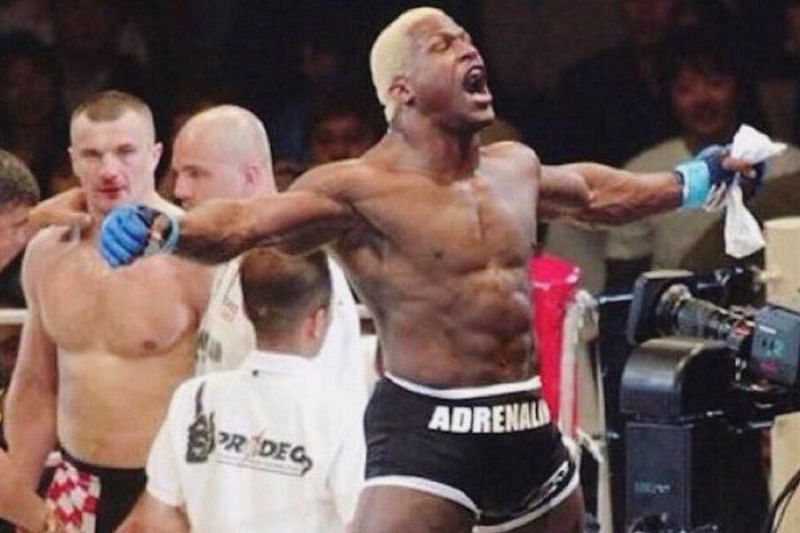
3 UFC legends who should be inducted into the Hall of Fame
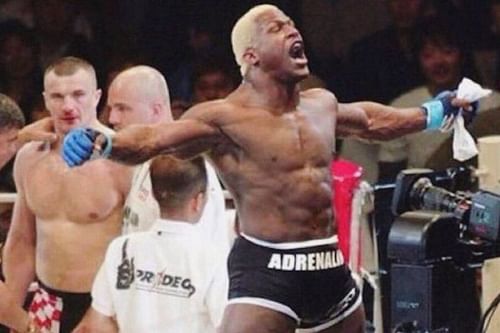
One of the most notable parts of last weekend’s UFC on ESPN show saw the announcement that former UFC Heavyweight champion Kevin Randleman would be inducted into the promotion’s Hall of Fame this summer.Randleman – who tragically passed away in 2016 – will join the likes of Randy Couture, Don Frye and Royce Gracie as part of the Hall’s ‘Pioneer Wing’, for fighters who turned professional before the introduction of MMA’s Unified Rules in late 2000.
While there has been some criticism of the UFC’s Hall of Fame – most notably that it often ignores fighters who aren’t on good terms with the promotion – with 17 pioneers now inducted, it is growing in prominence and credibility year by year.
But that doesn’t make it perfect; in fact, there are a number of pioneers who belong in the Hall who have yet to be inducted. Here, then, are 3 legends of MMA who should be inducted into the UFC’s Hall of Fame.
#1 Jens Pulver
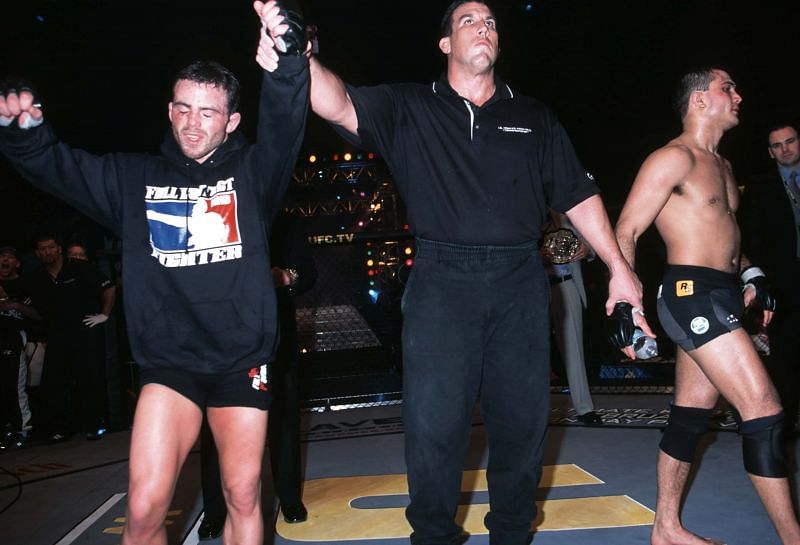
The UFC’s first-ever Lightweight champion, it’s baffling to think that Jens Pulver has not been inducted into the promotion’s Hall of Fame yet, particularly considering that he doesn’t appear to be on bad terms with UFC President Dana White.
A true pioneer of MMA’s smaller weight classes, ‘Lil Evil’ debuted as a professional back in 1998, and after going 3-1 on Bas Rutten’s Invitational cards, he debuted in the UFC in 1999, drawing with Alfonso Alcarez. Over the years that followed, Pulver won another 6 fights – including a brutal knockout of John Lewis at UFC 28.
That was enough for the promotion to match him with Caol Uno in the inaugural UFC Lightweight title fight – and ‘Lil Evil’ came out on top, becoming the first 155lbs champion in promotional history. Two successful title defenses – against Dennis Hallman and BJ Penn – followed, before a contract dispute in 2002 left him on the outside looking in.
Over the years that followed, Pulver became somewhat of a nomad, fighting all across the planet and having a notable run in PRIDE before returning to the UFC in 2006, where he famously coached on the 5th season of The Ultimate Fighter alongside his old rival Penn.
2007 saw Pulver move to the UFC’s sister promotion, the WEC, for a run at 145lbs. This didn’t go so well for ‘Lil Evil’ as he put together a disappointing record of 1-5 before departing in 2010, but realistically, he was far past his prime at that stage anyway. He would eventually retire from MMA in 2014.
Why does he belong in the Hall of Fame? Simply put – in the US at least – no other fighter did more to establish the smaller weight classes during MMA’s ‘Dark Ages’ than Pulver. His boxing-heavy style and lovable personality endeared him to the fans, and it’s easy to forget that his first fight with Penn was the first time the UFC had headlined a card with two 155lbers.
Essentially, ‘Lil Evil’ is the very definition of a pioneer.
#2 Marco Ruas
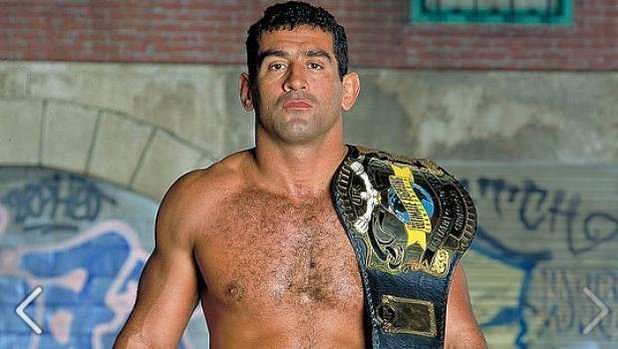
The UFC has inducted a number of fighters from its early, ‘Wild West’ days into its Hall of Fame; names like Ken Shamrock, Royce Gracie and Dan Severn were amongst its first inductees. One name currently missing from that list? UFC 7’s tournament champion, Brazil’s Marco Ruas.
Where Royce Gracie introduced the world to Brazilian Jiu-Jitsu, Ruas shone a light on another, closely related Brazilian fighting style – the discipline known as Vale Tudo. A hybrid of kickboxing, grappling and street fighting, Ruas’ Vale Tudo was in essence a precursor to the modern MMA we know and love today.
When Ruas debuted in the UFC in 1995, the promotion had seen plenty of rough and ready brawlers. But ‘The King of the Streets’ was different. He was certainly ready to brawl, but unlike many of the UFC’s notable street fighters, Ruas actually had serious skills.
He submitted his first opponent with a heel hook, beat his next with strikes, and in the tournament final, he introduced the world to leg kicks – using them to mercilessly chop down his larger foe Paul Varelans, winning the UFC 7 tournament in the process.
The Brazilian would next fight in 1995’s Ultimate Ultimate tournament, losing to Oleg Taktarov in the semi-finals, and only returned to the UFC once after that – in a 1999 loss to fellow veteran Maurice Smith.
But while his MMA record of 9-4-2 doesn’t look all that impressive, it’s easy to forget that Ruas was already 34 when he debuted in the UFC; he’d been fighting for years prior and was likely past his athletic prime by that stage anyway.
But Ruas’ legacy isn’t just about his fighting career. As the head coach of the famed Ruas Vale Tudo team, he also introduced some great fighters into the world of MMA – including UFC title challengers Renato ‘Babalu’ Sobral and Pedro Rizzo, as well as current UFC star Cub Swanson.
The UFC has never shied away from recognising its earliest pioneers – and ‘The King of the Streets’ should definitely be considered up there with the best of them.
#3 Frank Shamrock
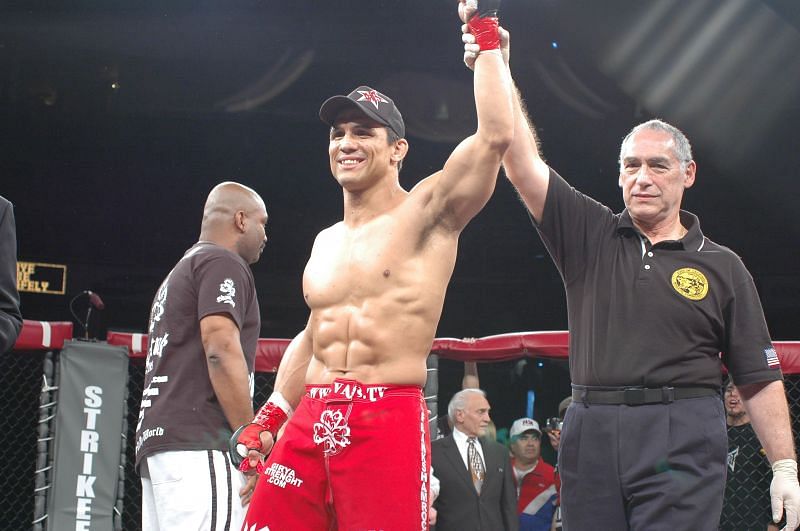
The likelihood of Frank Shamrock being inducted into the UFC’s Hall of Fame seems very slim right now. No other former star, even the likes of Tito Ortiz and Randy Couture, has burned their bridges with the promotion quite so much as the former UFC Middleweight champion. But does he belong in there? Absolutely.
Shamrock – the adopted brother of UFC Hall of Famer Ken Shamrock – unsurprisingly got into the world of MMA due to his brother’s involvement. As part of Ken’s Lion’s Den team, he trained alongside his brother, as well as the likes of Jerry Bohlander and Guy Mezger, and put together an extensive record in Japan’s Pancrase promotion.
By the time he debuted in the UFC in 1997, though, Frank had split from the Lion’s Den and made a move that arguably changed MMA as a whole. He formed ‘The Alliance’ with famed kickboxer Maurice Smith, and the duo began to truly cross-train the disciplines of striking and grappling.
Shamrock won the UFC’s Middleweight title in his first fight with the promotion, submitting Olympic wrestler Kevin Jackson after just 16 seconds, and his first defense was equally decisive, as he slammed Igor Zinoviev into unconsciousness after just 22 seconds.
Title defenses against Jeremy Horn and John Lober followed before Shamrock faced his biggest challenge in the form of a young Tito Ortiz. The future poster-boy of the UFC had destroyed two of Shamrock’s former Lion’s Den teammates, and so the fight had a very personal undercurrent.
The two met in the main event of UFC 22 in 1999, and put on an instant classic. Shamrock essentially adopted a form of ‘rope-a-dope’, allowing Ortiz to wear himself out in the early rounds with his wrestling and ground-and-pound while absorbing less damage than it was initially thought.
When Ortiz tired late in the 4th round, Frank came alive, suddenly turning the tables on his younger foe before stopping him with a series of strikes to the head. The fight was widely recognised as the greatest in UFC history to that point – and as it turned out, it would be Shamrock’s final one in the promotion.
He announced his retirement after the victory, relinquishing his title, and while he remained part of the UFC when it was bought out by the Fertitta brothers and Zuffa in 2001, he soon clashed with the new regime and became persona non grata with the promotion shortly after.
Following his departure from the UFC though, Shamrock was still a huge deal in the MMA world. His ‘Alliance’ with Maurice Smith eventually developed into a burgeoning team that became known as the American Kickboxing Academy – the camp that would produce UFC greats such as Cain Velasquez, Daniel Cormier and Josh Koscheck.
The former UFC champion was also a huge part of the StrikeForce promotion’s early years, with his fights against Cesar Gracie, Phil Baroni, Cung Le and Nick Diaz helping to build Scott Coker’s regional outfit into the UFC’s biggest competitor for a time.
In all honesty, if the UFC really wants to up the credibility levels of its Hall of Fame, they should induct Shamrock – who no longer offers any kind of competitive threat as he did during his StrikeForce tenure – into the Pioneer Wing with or without his co-operation. His achievements in the promotion’s early days are simply too important to ignore.